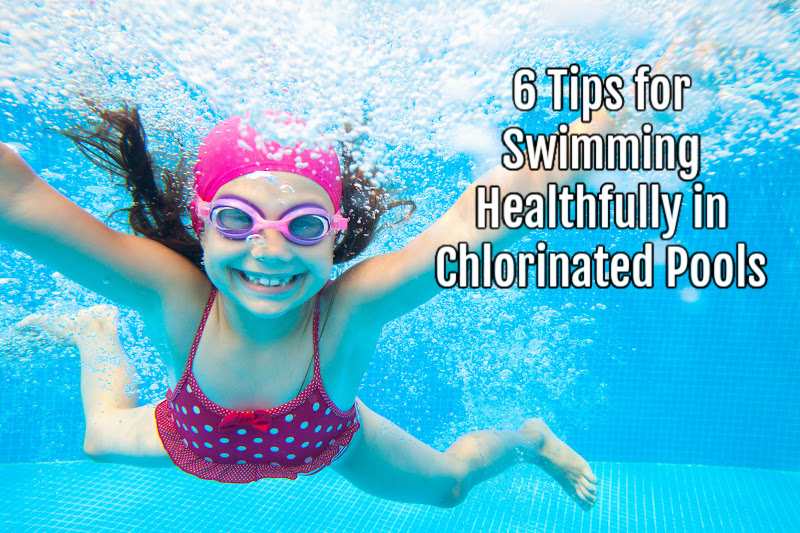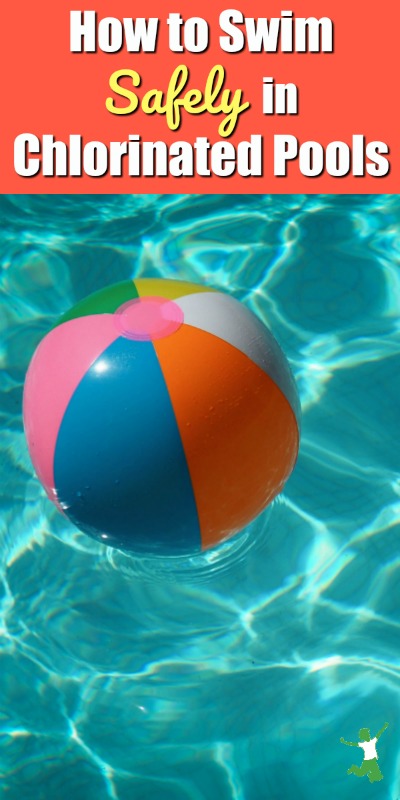The reasons why swimming in chlorinated pools is dangerous to health and the 6 steps to take to protect yourself and your family while still enjoying water fun all summer long.

The reasons why swimming in chlorinated pools is dangerous to health and the 6 steps to take to protect yourself and your family while still enjoying water fun all summer long.
An important topic to explore as we head into the summer season is chlorinated pools.
Chlorine is popular because it handles the three main jobs in keeping a swimming pool clean: It sanitizes (kills bacteria and germs), oxidizes (controls organic debris from perspiration and body oils), and deters algae. The chemical is unpopular, however, because it has a strong odor, reddens eyes, causes allergic reactions in some swimmers, and is a known carcinogen – meaning it has been linked to cancer!
Chlorine absorbs into your skin. Too much exposure to chlorine has been linked to major health problems including reproductive disorders and even birth defects. It can cause your skin and hair to dry out and over time too much exposure can even cause wrinkles.
Editor’s Note: Have you ever wondered why Olympic swimmers seem to have so many wrinkles at such young ages and most of the men start losing their hair so quickly? Could it, in fact, be caused by overexposure to chlorine for so many years and so many hours every day? Perhaps so.
When chlorinated pools are indoors, toxic gases such as nitrogen trichloride are released, which can be very dangerous. When we breathe in this gas it can cause severe damage to the lining of the lungs which could lead to respiratory problems or asthma. This toxic gas can be harmful at any age yet it poses the most risk to elderly people and small children.
So while chlorine used to disinfect swimming pools is widely recognized as a health hazard, not everyone has access to the ocean or a lake, or pools treated with ozone, ionizers, bromine, silver-cooper, or other alternatives which can frequently be much more expensive.
6 Tips to Protect Health in Swimming Pools
If you or your family members do choose to swim in chlorinated pools, some recommendations I’ve read are to:
1. Swim in outdoor chlorinated pools only if at all possible. It is much safer because the toxic gases are mostly eliminated in the open air.
2. Swim in chlorinated pools occasionally. It is regular exposure to chlorinated pools that presents the greatest risk to health.
3. Shower immediately before and after using a natural Castile soap.
4. Drink plenty of home-filtered water (better than bottled!) beforehand so that you are well hydrated.
5. Consider wearing a mask and snorkel to shield your eyes – and even a wetsuit, if you are willing to go that far!
6. Get fresh air afterward so you don’t continue to inhale the fumes, and can clear your lungs.
Why shower immediately before swimming in a chlorinated pool?
Julie Deardorff explains in her article published in the Chicago Tribute, “Another important reason to shower is that our bodies generally contain residue from consumer products, including perfume, make-up, body lotion, shampoo, and sunscreen.
When the chemicals used to disinfect the pool mix with organic matter (sweat, hair, urine) or nitrogen-rich substances (commonly found in consumer products) it can create a more toxic agent, said Michael Plewa, a professor of genetics at the University of Illinois whose new research has linked pool chemicals to health problems, including asthma and bladder cancer.”
Red, burning, itchy eyes and skin?
What I’ve read is that the presence of chloramines can cause reactions such as red, burning, irritated eyes: Chloramines form when chlorine reacts with ammonia. Ammonia enters the pool through sweat and urine. It is important to teach children not to urinate in pool water [even though it is chlorinated].
Also, showering before swimming can remove excess sweat that interacts with chlorine. My understanding is that if the sweat is on your skin, and hasn’t been rinsed off first in the shower, the chlorine will interact with the sweat on your skin as you enter the pool, and may result in some folks getting itchy skin.
So, what do you think? Do the benefits and joy of swimming and playing in a pool outweigh the health risks of chlorine?

Additional articles on this topic
The Dangers of Chlorine
Asthma In Swimmers
Swimming Pools May Increase Cancer Risk
The Hidden Danger of Swimming Pools
Swimming Pool Alternatives to Chlorine
Water Birth Dangers








Hi guys,
I’m so glad this article was posted! I had noticed that after swimming in indoor pools for exercise my skin was getting worse and so were my allergies and it was really frustrating.
I didn’t notice as much with my pool at home, but still didn’t want to use chlorine anymore. I switched to Clear Choice products and my skin and body feels a lot better after leaving the pool at home and my hair doesn’t smell!! Thought I would share because it worked for me, and might work for you too!
http://www.clearchoiceaustralia.com.au/
Thank you for this! My son literally had a reaction to the pool for the first time today.
I have found that drinking a lot of water and doing an activity like running that causes you to sweat a lot after swimming helps to get rid of the chlorine that you’ve absorbed through your skin. Although showering does help, I’m sure you’ll notice after a swim that you’ll still smell the chlorine when you turn on the shower the next day. Sweating it out ASAP after a swim is the truly the best way I’ve found to get it out of your body.
Maybe coating your kids in a thin layer of coconut or olive oil (similar to a sunscreen application) would help reduce the chlorine absorption.
Let me guess; coat yourself in Lard? 🙂
Julie, in my experience many pools in the US have a sign that says you must shower before you get in, but almost no pool enforces this rule. I’m not sure if I’ve ever known anyone who really consistently follows this pseudo-rule or tradition or whatever it is. I’ve personally always thought it was an incredibly odd rule. And now that I’ve learned about how dangerous our efforts towards sterilizing our environment are I’m all the more convinced that it is just an extreme version of the mental health disorder furthering our societies germ phobia.
Hi Sheril. I, for one, always shower before I get in. One benefit for this showering rule (law where I live in upstate NY) is that it minimizes the amount of chemicals that are required to maintain the proper pH level in the pool (7.4 to 7.6). Allowing the pH to go too far one way will allow all kinds of bad things to thrive in that water. Your stank, oil and sweat all contribute to this pH balancing act. Teaching kids to not piss in the pool (to the point where they actually don’t, which requires parents paying attention and following up) will help this. Every time a little one drops a baby ruth in the pool, we (the lifeguards, hi there) have to (literally have to) clear the pool and shock treat it…. meaning we dump a crap load of chlorine (or something else, if using bromine in place of chlorine) to assure that any bugs in the poop are killed off. 45-60 minutes later, everyone can go back in. If three little ones crap 3 times in a day, that’s bleach blonde hair for everyone. I really like the 2 pool system, where little ones are not allowed in the big pool. To make things worse, any of us that are competitive swimmers (hi there) who need one of these pools to swim a workout in are going to sweat way more than we need to, because the pools are usually way too hot for this type of thing. More sweat, more chemicals. Again, 2 pool system would help as the little ones, and the old folks who do not intend on moving enough to stay warm (???) can be in the little warm pool. The pools that you guys are visiting are probably public pools where people come in, not really giving two craps about what they leave behind because they don’t have to deal with it (or are ignorant of these things), and are, here it comes, poorly run by people who have absolutely no business running that which they do not understand. As for the Chlorine or bromine what ever is in use there, I carry a small spray bottle with water and some powdered acsorbic acid (Vit C) and when I take my post swim shower, I soak myself with that, rub it in, wash as normal and no pool smell, no itchies. Since it is nothing more than Vitamin C, I can literally spray this stuff in my mouth if I want.
I still can not figure out, why a country like Canada, can not do something BETTER with the pools and chlorine. Many many years ago- Hungary (and communist back than too!) used laser disinfection method, completely bypassing the chlorine issue. How could a small country like Hungary do that long time ago, and here it is a health issue???? Looks like the chemical companies are really strong in North America!
mms jim humble cures malaria with it!http://www.miraclemineral.org/
I believe with enough vitamin C and and a daily iodine source such as kelp you are probably okay with moderate exposure. I wouldn’t stay in it every day however.
Can children take the daily iodine? And what kind (would) do you choose?
ooh, I love the link to alternatives, found in the middle of the article. nice!